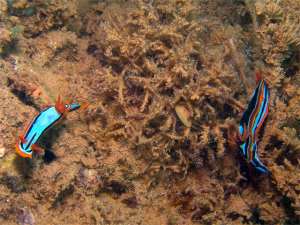Chromodoris westraliensis from Ningaloo
January 5, 2005
From: Kristin Anderson

Not sure if these are simply more colour variations of Chromodoris elisabethina or if they are different species altogether. We seem to get quite a variety of these orange, blue, black, white nudibranchs and some of the colour variations are tricky for us!
Locality: Ningaloo Reef, Exmouth Gulf, Western Australia, Indian Ocean. Depth: 10 m, Length: 30-40 mm. 30 December 2004, silty bottom
Photographer: Kristin Anderson
Kristin Anderson
kristin@exmouthdiving.com.au



Dear Kristin,
These are both Chromodoris westraliensis, which as the name suggests, are found in Western Australia. It shows quite a bit of colour variation, and looks quite like two other species, C. elisabethina and C. annae. If you look at some other photos on the Forum you will see that both C. westraliensis and C. annae have small dark spots on the blue region of the mantle [we call this a punctate pattern] which suggests that perhaps the two species are closely related. The main differences are that in C. westraliensis there is usually a black band across the central part of the mantle, and there is usually a trace of black between the orange mantle border and the blue inner colouration. You can see that in the upper right and bottom left photos.
And before you say it - I can't see the punctate pattern in your photos. Perhaps the lighting disguises the dark specks in your photos?
Best wishes,
Bill Rudman
Related messages
-
Chromodoris westraliensis from Exmouth, Western Australia
From: Bruce Potter, April 4, 2008 -
Chromodoris annae or C. westraliensis? from Exmouth
From: Bruce Potter, April 4, 2008 -
Chromodoris westraliensis from W. Australia
From: Monika Stambergova, February 11, 2004 -
Chromodoris westraliensis from the north of WA
From: Clay Bryce, April 28, 1999
